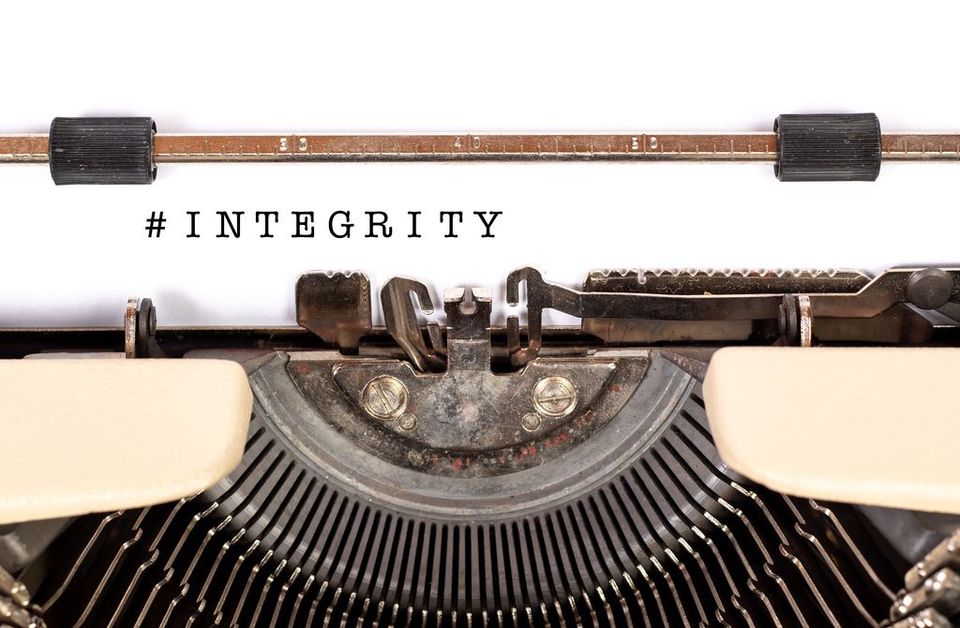The Way of Queer Leadership Is Never a Straight Path

Queering the Path to Evolutionary & Humanitarian Leadership
Possibly the most important and vital quality in a leader is integrity.
We demonstrate integrity with honesty and strong moral principles (Source). Integrity is a challenging quality to uphold. Sometimes you need to make a decision, one that may seem like the right one at the time. If others question your decision, but you can’t share your reasons, does that make you dishonest?
Dictionary definitions of words don’t always give us the whole picture — the semantic field that has developed over time and the subtle layers of meaning behind a word. The etymology of integrity is:
c. 1400, “innocence, blamelessness; chastity, purity,” from Old French integrité or directly from Latin integritatem (nominative integritas) “soundness, wholeness, completeness,” figuratively “purity, correctness, blamelessness,” from integer “whole”. — Source
When doing the right thing is perceived as the wrong thing.
In the summer of 2018, I published a post about leadership which was sharply criticized by a group of individuals who — only a few days earlier — were colleagues and supportive of what I was creating. They had fallen under the spell of someone whom they thought a leader — a bully leading without integrity. That person was out to attack, harass, and defame me for a decision I had made, which fuelled their vendetta based on something else entirely unrelated. They encouraged groupthink in their followers — to the extent that not one of them ventured to ask for my side of the story. In a situation where others were already on the defensive, I discovered that minds don’t change in a fight.
This was an important and vital lesson for me to learn and an example of leading out of integrity. I had made a decision that was based on my moral principles. I thought it was the best and the right thing to do. Part of the choice I made involved protecting someone else’s character. I still struggle with the “moral question” of, “Was that choice dishonest?” How did my intention, my belief that I was protecting someone else’s integrity affect mine?
This situation taught me yet another one of the many required qualities of leadership: to know when you’ve made the wrong decision, or that you made a mistake — not for what you said or did — but rather for the qualities you chose at the moment with which to lead.
There is a huge space between leading without ethics and leading with integrity.
With the later, there is no failure per se. If upon reflection, you feel that you made what you thought was the best choice at the time, is that not leading with, or at least towards, integrity? Rarely are any of our choices perfect, but in leadership, misunderstandings happen only when there isn’t complete and honest disclosure. Sometimes withholding information is a necessary part of leadership, if the choice was well-intentioned and not morally unjustified.
Individual Leadership Will Never Be Perfect.
Human beings are not perfect. Even when we do our very best, with the best intentions, with the information we have at hand, closing what we believe are the best characteristics and qualities of leadership, trusting our instincts, and hoping we are making both humanitarian and solid moral decisions, mistakes will be made. Or, one group will agree, support, and thank you for your leadership, while another group will gang up on you, assuming the worst.
Sometimes the most unrecognized form of leadership is when the leader takes full responsibility for the original problem, even when the source of the problem was not of their doing. I would suggest at this point, the fact that a leader makes mistakes is a vital part of, not just their humanity, but for their “followers” to witness. When we elevate a leader to super-human status, into a position where they can do no wrong, we have created the possibility of a dictatorship and an ideology.
The Essentials of an Evolutionary, Humanitarian Leadership.
So how can we experience and demonstrate our unique insights and gifts as LGBTQ people in an acting leadership capacity?
If I were to ask a group of people from all walks of life the question, “What is leadership?”, I could create a list with hundreds of attributes. However, let’s keep this discussion narrow in approach to pull back the veil of my idea. I’m going to loosely term my explanations of the core essentials of leadership as “evolutionary” and “humanitarian”.
1. Don’t lead others directly.
Lead by example. Lead yourself with the utmost integrity, authenticity, and transparency, as if everyone is watching — even when no one is.
Practice the mantra, “How I do one thing, is how I do everything.”
2. Give people an evolving philosophy.
Give people better ways to think and ways to think more critically. Help people think in a way for the betterment of all humanity, to create a transformational, evolutionary change that impacts the world.
Ask often, “How can I be the change I want to see in the world?”
The Way of Queer Leadership Is Never a Straight Path.
We could select from the hundreds of thousands of leadership books and come up with the top 10 books on leadership. We could curate a list for the top 10 books as recommended by the worlds top 10 leaders and we would still have the space to develop a new path of leadership.
There are many qualities of leading and many characteristics of being a great leader. What if we choose the path of influence, through our insights and gifts as LGBTQ people, for the capacity to think queerly and lead the status quo in thinking outside the narrow confines of how they think they’re supposed to think?
While we consider the qualities of a great leader through the lens of aspiring to leadership qualities alone — including the confluence of several qualities at one time — what does individual leadership look like when someone embraces their unique gifts and insights to lead by example? What does leadership look like when we embrace our queerness?
What if we surrendered the need to “follow the leader”?
Can you imagine a country lead by a group of leaders instead of a single person claiming the title of president or prime minister? A collective instead of a single leader? That might seem too far-fetched, or too difficult to imagine such a structural change to the governments and society we see today. Can you hear the nay-sayers using words like leftist liberals and socialists, as if those labels themselves indicates something inherently immoral?
What if there was no more presidential veto? What if we no longer elected a single representative or a political ideology based on charisma? What if we lead ourselves from a group of people who must work together to lead by consensus; a group that is both diverse and representative of the society it seeks to lead? What if this group was not comprised of politicians, but instead a rotating group of citizens with a mandate that would limit corruption through diversity, and control prejudice through fair and honest representation?
This is a type of leadership called “Sortition”, which Brett Hennig details in his book, “The End of Politicians: Time for a Real Democracy.” Hennig suggests that there is a way that,
“…we can fix democracy by eliminating politicians and replacing them with a representative network of everyday citizens. A wealth of recent evidence has shown that groups of randomly selected, ordinary people can and do make balanced, informed and trusted decisions. These citizens’ assemblies are legitimate, accountable, competent and, above all, convincing demonstrations that we can govern ourselves.”
This might be one of the queerest approaches to “governance” that I have ever heard; one that I will come back to later, as I connect this web of ideas that gives shape to a queer leadership.





Member discussion